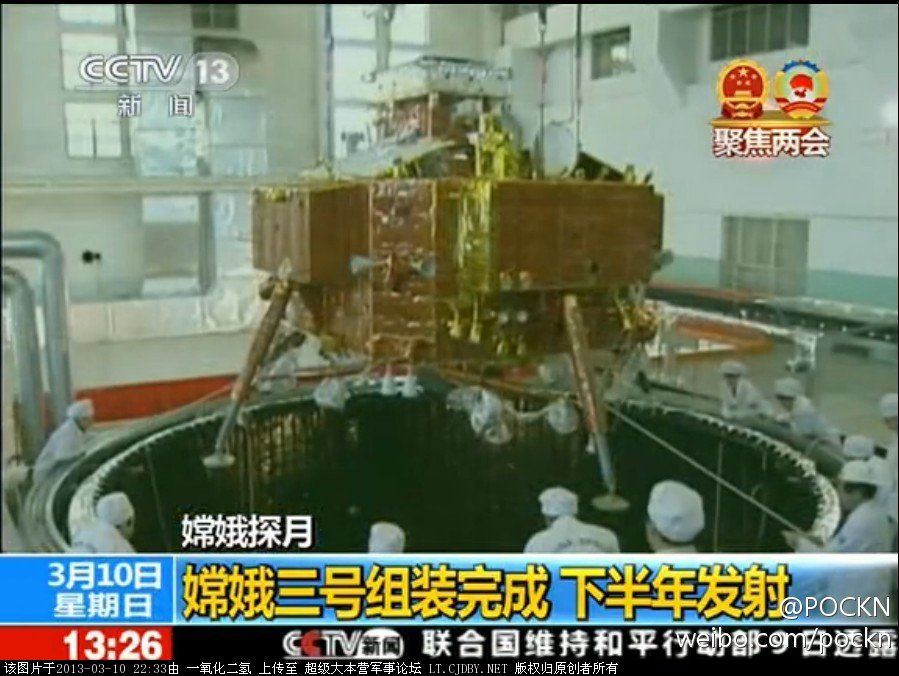You are using an out of date browser. It may not display this or other websites correctly.
You should upgrade or use an alternative browser.
You should upgrade or use an alternative browser.
China's Space Program News Thread
- Thread starter crazyinsane105
- Start date
- Status
- Not open for further replies.
escobar
Brigadier
The Egyptian Authority for Remote Sensing and Space Sciences (NARSS) and the China Academy of Space Technology (CAST) signed a memorandum of understanding to build a satellite assembly plant in Egypt, benefiting from the Chinese expertise in this respect.
In statements to MENA on Thursday 07/03/2013, NARSS Chairman Dr. Mohamed Medhat Mokhtar said that under the MoU, the Chinese side will review and approve the design of the Egyptian satellite "Egypt Sat 2", which is expected to be finalized by the Egyptian side in July 2014.
The new satellite will be manufactured, assembled and tested in the plant to be established in Egypt, he added.
In accordance with the deal, the Egyptian side will also be allowed to take part in the Chinese space missions and new in-orbit technology demonstrations, Mokhtar said. An Egyptian delegation is currently visiting Beijing in this respect.
escobar
Brigadier
China is looking to promote more civilian uses of its Beidou sat-nav system, scientists and industry figures told a seminar in Shanghai yesterday.
Applications could include a role in driving tests, typhoon and landslide monitoring, traffic management, agriculture, manufacturing, surveying and mapping, the Beidou seminar in Jiading District heard.
Beidou has already proven itself in defense, communications, state grids and national safety plans, leading the national government to expand its uses.
Experts at the seminar said promoting Beidou's civil uses can help bring its price down and break the market domination of overseas companies.
Combining the US global position system (GPS) and China's Beidou - also known as Compass - yields better results than only one system, as their respective satellite network coverages have strengths and weaknesses, said experts.
"A new driver exam system based on Beidou and GPS can be accurate to the millimeter and is used in 17 provinces," said Wang Chang, manager of Shanghai Compass Navigation Co, one of the developers.
Previously judging parking and other manoeuvres depended on sensors, which can be influenced by weather and electromagnetic interference. "The new system is fairer. It is being created in Shanghai to be introduced soon," said Wang.
For disaster prevention and control, the combination of Beidou and GPS has been tested in bridge and landslide monitoring.
Last edited:
They actually tracked all those debrise - down to .08 grams, for years and completely certain that the debris is Chinese? How strong is their proof, or is this still another smear report? (we don't know who did it but we'll blame it on the guy people are most likely to subconsciously agree)
AssassinsMace
Lieutenant General
They couldn't detect that meteorite over Russia estimate to be 10 meters long and up to 10,000 tons. And we're suppose to believe they can track "thousands" of tiny pieces from a satellite that's spread around since 2007? I still laugh at that depiction of the debris field from the destroyed satellite that covers more than half the world. I wonder why we haven't experience a mass extinction and ice age yet. Notice no one's worried about the debris field left by that meteorite when it exploded hitting the atmosphere.
escobar
Brigadier
China will build up an integrated mapping system to cover the ground, underground, sea, air and outer space by 2020, said a senior official of the national surveying and mapping authority.
The system, when completed, will facilitate the country's economic development, national defense and government decision-making, Li Pengde, deputy director of the National Administration of Surveying, Mapping and Geoinformation, told Xinhua News Agency in an interview late Monday.
It will also provide spatial position information conducive for the government to cope with emergencies and for people to live with greater convenience.
For this purpose, said Li, the system will adopt new-generation equipment and technologies, including surveying vehicles and vessels, medium- and low-altitude remote sensing mapping platforms, aerospace mapping satellites and underground measuring robots.
China has made substantial progress in developing this equipment and technology, the official added.
- Status
- Not open for further replies.

